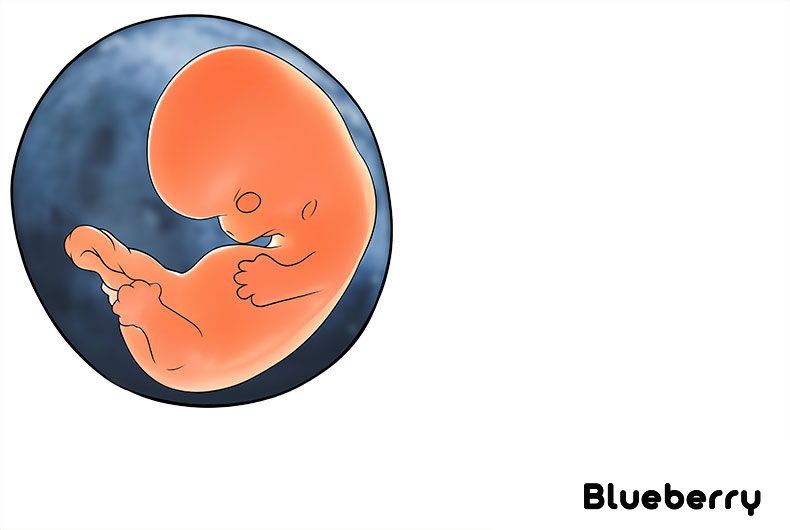7 weeks pregnant

People may not even notice it yet, but there is a whirlwind of changes happening within you. In the middle of the 2nd month of pregnancy, the baby is developing rapidly and it is likely that some clothes already start to be tight.
Perhaps this week you will be able to hear your baby’s heart, which is beating 150 times a minute, but don’t be worried if it still doesn’t happen, as he is very small. If it doesn’t happen now, wait for the next few weeks to get that feeling.
For now, keep taking care, relax and enjoy every moment of everything that is happening. Do you want to know a little about the changes with your baby and also with you? Then read more about the 7th week of pregnancy.
Baby development
The placenta is larger than the baby, which now measures between 6 and 9 millimeters and by the end of the week, it will be 13 millimeters and should weigh 0.8 grams, comparable to a bean or corn kernel.
The shape of the body is still a C, because the head is tilted towards the abdomen. The eyes begin to approach, the bones develop and the features are formed.
Arms and legs are developing, elbows move and fingers are together. The baby moves, however as he is very small, the mother will hardly feel. Some mothers even expect to have this sensation, but do not compare your pregnancy with others.
What happens to mom
The belly will take a little longer to grow, as the uterus begins to expand and is the size of a medium orange. Swelling and constipation, possible symptoms, can make the belly a little bigger.
The seasickness will be present until the 16th week, or the end of the first trimester. As there is a difference between pregnancies, there are women who do not go through this and others who have nausea during the whole pregnancy.
There are some tips for relieving nausea, such as eating small meals every three hours and eating two crackers before getting up. A good ally for this hour is the lemon, having a glass of ice water and squeezed lemon, or just pure juice, helps well and is a great source of vitamin C.
With the growth of the uterus, hormonal changes and increased blood volume, visits to the bathroom to urinate are more frequent. As uncomfortable as it may be, do not reduce fluid consumption. Always stay hydrated.
Hormonal changes, associated with normal pregnancy anxiety, will cause you to have mood swings. Talk to your partner and family members who already know about the pregnancy and don’t be surprised if one time you are happy with everything that is happening, and the next, you start to cry and get angry. Try to relax and enjoy this incredible moment of your life.
Care that should be taken at this stage
When pregnant, health care needs to be doubled. Frequent consultations with the doctor for prenatal care are essential, as well as:
– Eat a healthy and balanced diet
Eat more fiber and foods rich in vitamin C, folic acid and iron. If you eat properly, you avoid getting fatter than necessary, have more energy during pregnancy and ensure your baby’s good development.
– Stay hydrated
Reinforcing the above recommendation. It can be quite annoying to need to go to the bathroom several times a day, however, drinking 2 to 3 liters of fluids daily has many benefits, including better bowel function, reduced fluid retention, reduced risk of hypertension and infections urinary tract infections, weight control, toxin elimination and amniotic fluid formation.
– Consult a dentist
Increased blood flow can damage the gums, causing bleeding and tooth problems. Most hormones, such as progesterone, tend to cause so-called gingivitis gravidarum.
It is important to remember to tell the dentist that you are pregnant to avoid using anesthesia and x-rays, which are harmful to the baby
Hyperemesis Gravidarum
This rare condition affects 1.5% of pregnant women. When nausea and vomiting occur throughout the pregnancy with great intensity, resulting in weight loss, dehydration, weakness, dry mouth and malaise, among other problems.
The treatment is done with medical monitoring, which will request tests to rule out possible diseases. It is likely that the pregnant woman needs to take medications intravenously, that is, in the vein and has a more restricted diet.
